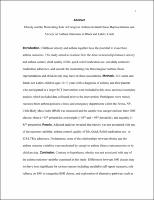Please use this identifier to cite or link to this item:
https://hdl.handle.net/20.500.12202/9168| Title: | Obesity and the moderating role of caregiver asthma-related illness representations and anxiety on asthma outcomes in Black and Latinx youth |
| Authors: | Feldman, Jonathan M. Weinberger, Andrea H. Gonzalez, Jeffrey S. Swencionis, Charles Rastogi, Deepa DiCicco-Bloom, Jared |
| Keywords: | Psychology |
| Issue Date: | Apr-2023 |
| Publisher: | Yeshiva University |
| Citation: | DiCicco-Bloom, J. (2023, April). Obesity and the moderating role of caregiver asthma-related illness representations and anxiety on asthma outcomes in Black and Latinx youth (Publication No. 30635382) [Doctoral dissertation, Yeshiva University]. PDTG |
| Series/Report no.: | Ferkauf Doctoral Dissertations;Publication No. 30635382 |
| Abstract: | Introduction. Childhood obesity and asthma together have the potential to exacerbate asthma outcomes. This study aimed to examine first: the direct relationships between obesity and asthma control, child quality of life, quick relief medication use, and daily controller medication adherence, and second: the moderating role that caregiver asthma illness representations and child anxiety may have on these associations. Methods. 303 Latinx and Black-non Latinx children ages 10-17 years with a diagnosis of asthma, and their parents who participated in a larger RCT intervention were included in this cross-sectional secondary analysis which included data collected prior to the intervention. Participants were mainly recruited from asthma/pediatric clinics and emergency departments within the Bronx, NY. Child Body Mass Index (BMI) was measured and the sample was categorized into three BMI classes: obese (> 95th percentile), overweight (> 85th and < 95th percentile), and majority (< 85th percentile). Results. Adjusted analyses revealed that obesity was not associated with any of the outcome variables: asthma control, quality of life, Quick Relief medication use, or ICS/LTRA adherence. Furthermore, none of the relationships between obesity and the asthma outcome variables were moderated by caregiver asthma illness representations or by child anxiety. Conclusion. Contrary to hypotheses, obesity was not associated with any of the asthma outcome variables examined in this study. Differences between BMI classes may not have been significant for various reasons including unreliable self-report measures, sole reliance on BMI to categorize BMI classes, and exploration of alternative pathways such as pulmonary function or asthma perception that potentially moderate the relationship among obesity and asthma in this sample. |
| Description: | Doctoral dissertation, PhD / Open Access |
| URI: | https://hdl.handle.net/20.500.12202/9168 |
| Appears in Collections: | Ferkauf Graduate School of Psychology: Doctoral Dissertations |
Files in This Item:
| File | Description | Size | Format | |
|---|---|---|---|---|
| DiCicco-Bloom_Jared_FINAL DISSERTATION_Formatted_08132023.pdf | 835.76 kB | Adobe PDF |  View/Open |
This item is licensed under a Creative Commons License

